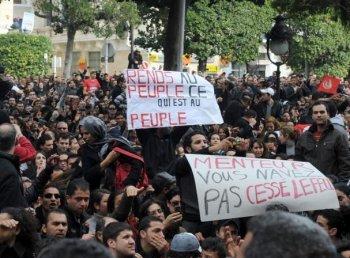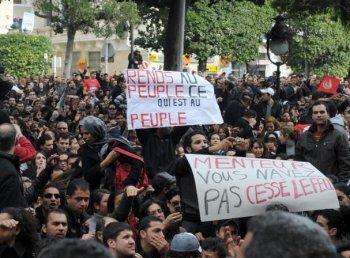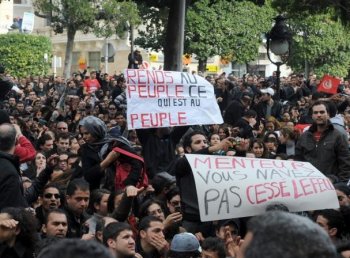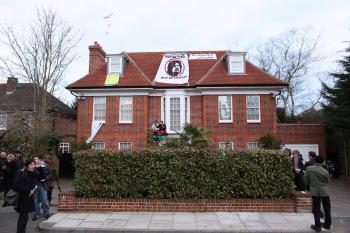Tunisian president Zine al-Abidine Ben Ali today dismissed his government, declared a state of emergency, and promised new elections within six months, succumbing to the unrelenting pressure from protesters, unsatisfied by his promise Thursday night not to seek reelection in 2014.
In a televised address on Thursday, just one day before, Ben Ali apparently ‘gave in’ to protesters, promising not to run for a sixth term in office—he’s been in power since 1987. He also promised freedom of the press, and that he’d call off the police.
Following Thursday night’s speech, the demonstrations continued, signaling that the president’s concessions were not acceptable. In clashes with the police that night, 15 people were killed in Tunis and in Kairouan in the interior of the country, according to Al Arabiya.
On Friday, the protests continued. In Tunis, 8,000 people gathered outside the interior ministry demanding the resignation of Ben Ali. In Tunisia, such demonstrations are not normally tolerated—as was the case again on Friday. The initially peaceful protests turned violent, as police took actions to disperse the crowds using teargas, anti-riot units, and tanks to chase down protesters, according to Le Figaro.
Within minutes, the streets were cleared of demonstrators, Le Figaro reported. Some protesters moved to terraces of cafes, throwing stones, chairs, and umbrellas at police.
In a televised address on Thursday, just one day before, Ben Ali apparently ‘gave in’ to protesters, promising not to run for a sixth term in office—he’s been in power since 1987. He also promised freedom of the press, and that he’d call off the police.
Following Thursday night’s speech, the demonstrations continued, signaling that the president’s concessions were not acceptable. In clashes with the police that night, 15 people were killed in Tunis and in Kairouan in the interior of the country, according to Al Arabiya.
On Friday, the protests continued. In Tunis, 8,000 people gathered outside the interior ministry demanding the resignation of Ben Ali. In Tunisia, such demonstrations are not normally tolerated—as was the case again on Friday. The initially peaceful protests turned violent, as police took actions to disperse the crowds using teargas, anti-riot units, and tanks to chase down protesters, according to Le Figaro.
Within minutes, the streets were cleared of demonstrators, Le Figaro reported. Some protesters moved to terraces of cafes, throwing stones, chairs, and umbrellas at police.




